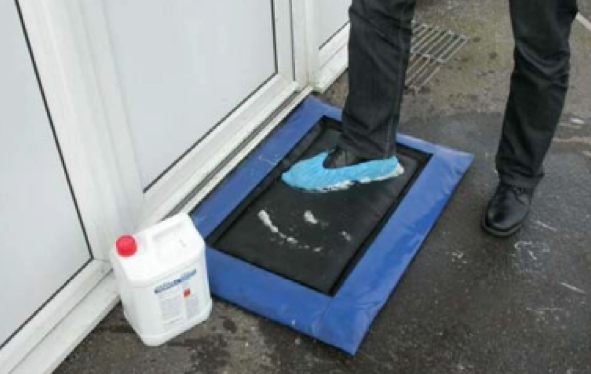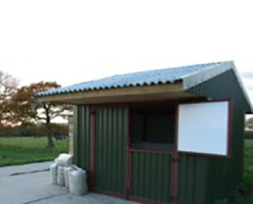Biosecurity and Disease Prevention
What is biosecurity?
- Definition: management practices designed to prevent or greatly reduce infectious diseases carried onto farms and stables
- Commonly and successfully used in agriculture
- Biosecurity programs must be tailored for each premises
- Discuss your specific needs with your vet
Why is biosecurity important?
- Helps prevent diseases from entering and/or exiting a farm and from spreading among horses living on the farm
- Protects animal health
- Protects human health (zoonoses)
- Reduction of financial losses:
- Prevention better than cure (and cheaper!)
- Keeps your business running
- Less likely to loose a horse through infectious disease
- Improves the horse industry by promoting healthy horses
Common causes of disease transmission
- Horse to horse (direct / aerosolised)
- Human to horse – vets, farriers
- Horse to human (zoonotic e.g. salmonella, ring worm)
- Fomites (tack, water buckets, water sources, shared feeding, common grazing)
- Wildlife and pests (rodents, birds, insects) and pets
Basic biosecurity principles
- Daily biosecurity measures
- Biosecurity of the new horse
- Biosecurity at competitions
- Vaccination
- Disinfection
Daily biosecurity measures
- Maintain horses in small groups of similar ages, minimize mixing
- Maintain fences/ gateways
- Routine cleaning and disinfection of buckets/stables etc.
- Hand washing
- Disinfectant foot/ dips between barns
- Individual equipment e.g. grooming kit, wheel barrows
- Isolation of new horses on yard
Figure 1: Disinfectant foot bath

Biosecurity of the new horse
- Common source of disease being introduced to a farm or stable
- Main worries:
- contagious respiratory disease
- skin diseases
- gastrointestinal parasites
- reproductive diseases
- neurological diseases
- Buy from a reliable source???
- Make sure vaccinations are up to date
- Veterinary examination
- ISOLATION – QUARANTEEN
Isolation facilities
- Physical separation (25m – 40m)
- Separate water supply
- Separate feed storage
- Separate muck heap - dispose of waste carefully
- Separate equipment – includes clothing, boots, tack, grooming
- Ability to disinfect after occupation – metal versus wood
- Disinfection facilities
- Separate handlers/handle last
- Restricted access
Figure 2: Appropriate isolation facilities for a new horse

Isolation times and health monitoring
- 2-3 week isolation period
- Health monitoring:
- Fever - a common symptom of a disease
- Take twice daily rectal temperatures to monitor any presence of fever (Temperature of above 102°F (38.8°C)
- Contact vet if:
- Horse stops eating and/or drinking, signs of lethargy
- Develops nasal discharge
Veterinary tests
- Main worry respiratory disease - strangles
- Blood sample for strangles at day 14 of isolation
- Strangles ELISA – screening test – not “black and white”
- Negative
- Positive
- Active infection – expect clinical signs
- Recent exposure (within last 6 months)
- Chronic, asymptomatic carrier
- POSITIVE REQUIRES FURTHER INVESTIGATION
Biosecurity at competitions
- Difficult:
- Horses leaving and coming back
- Horses coming on to your premises
- May not be possible/practical to isolate horses that are returning home, especially if you travel frequently
- May not be possible to isolate horses coming to compete on your premises
How do we minimize bringing disease home while travelling?
- Up to date vaccinations
- Clean, disinfected transport
- Avoid communal water troughs and bowls
- Use own water bucket and fill from a source that delivers fresh clean water
- Tie your horse to your own trailer
- If you must tie to a communal site, choose a non-porous surface and disinfect it before tying your horse
- Avoid horse to human traffic
Using stables at events
- Remove old bedding, if present
- Clean walls, railings and door to remove organic matter such as manure
- Disinfect surfaces such as water troughs and bowls, latches and handles
- Put in clean bedding
Competitions/ shows at your premises – minimizing the risk?
- Difficult
- Separate competition areas and stabling – if possible
- Health declarations for competitors
Vaccinations
Vaccination is the best way to prevent your horse from contracting respiratory diseases, which can be caused by viruses or bacteria. Obviously, if your horse’s booster vaccination were to lapse this may increase the risk of contracting a disease, which may otherwise have been preventable.
Bespoke biosecurity programmes
If you need to discuss your individual biosecurity needs, then please feel free to call Central Equine Vets on 0131 664 5606.
Back to Fact Files

